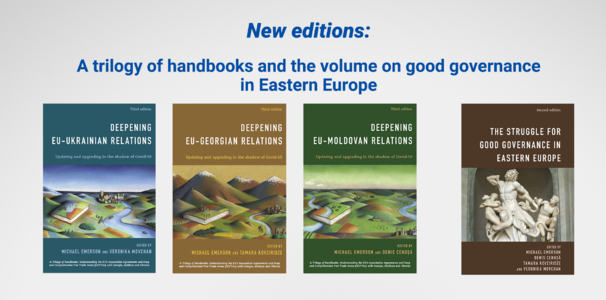
3rd edition of the Handbooks and 2nd edition on good governance in EE are out
These Handbooks, now in their third edition, represents the most comprehensive and independent assessment of the Association Agreements and Deep and Comprehensive Free Trade Areas (DCFTAs) between the EU and Georgia, Moldova, and Ukraine.
The purpose of the Handbooks is to make the complex political, economic, and legal content of the Association Agreements readily understandable. This third edition, published seven years since the Agreement’s implementation is substantially new in content, both updating how Georgia, Moldova, and Ukraine have been enacting the Agreements, and introducing new dimensions (including the Green Deal, the COVID-19 pandemic, cyber security, and gender equality).
Four teams of researchers from leading independent think tanks, CEPS in Brussels, the Reformatics in Tbilisi, the Expert-Grup in Chişinău, the Institute for Economic Research and Policy Consulting in Kyiv, collaborated on this project, with the support of the Swedish International Development Agency (Sida).
“These books offer a one-stop guide to the Association Agreements—the authors have painstakingly analysed the incredibly complex Agreements to deliver a compact and accessible overview to all those who need to grasp their contents. The national teams also shed light on the salience of the content for domestic reforms. Even though the books are not meant to be read like a book, the reader who does so is rewarded with a panoramic overview of the sheer scale and ambition of the AA-DCFTA. The books offer a plethora of pivotal insights into the Agreements while at the same time raising a number of important questions. A ‘Bible.’” — Kataryna Wolczuk, Centre for Russian, European and Eurasian Studies, University of Birmingham
The second edition of The Struggle for the Good Governance in Eastern Europe, three years after the first, complements three landmark Handbooks on the deepening relationships between the European Union and Ukraine, Moldova and Georgia.
At a time when many regions of the world, Europe included, see a resurgence of authoritarianism, several countries in Eastern Europe: Ukraine, Moldova, Georgia and Armenia, are struggling to counter this trend by developing European-style democracies. The story of Eastern Europe’s dramatic struggles to achieve properly functioning democracies and the rule of law rages on, warranting deeper analysis and substantial updating.
Highlights during this period include the spectacular ascent but questionable achievements of Vladimir Zelensky in Ukraine, the rise and fall of the pro-Russian presidency of Igor Dodon in Moldova, the deterioration of Georgia’s democracy under oligarchic state capture rescued and reversed by EU mediation, and the advent to power of Nikol Pashinyan in Armenia, now threatened by defeat in the second war over Nagorno Karabakh.
All editions are co-published with Rowman and Littlefield International (RLI), this book can be purchased from the RLI website.